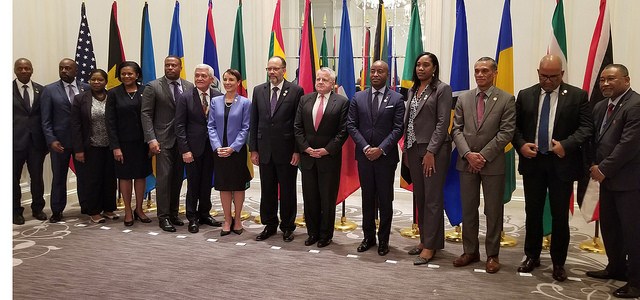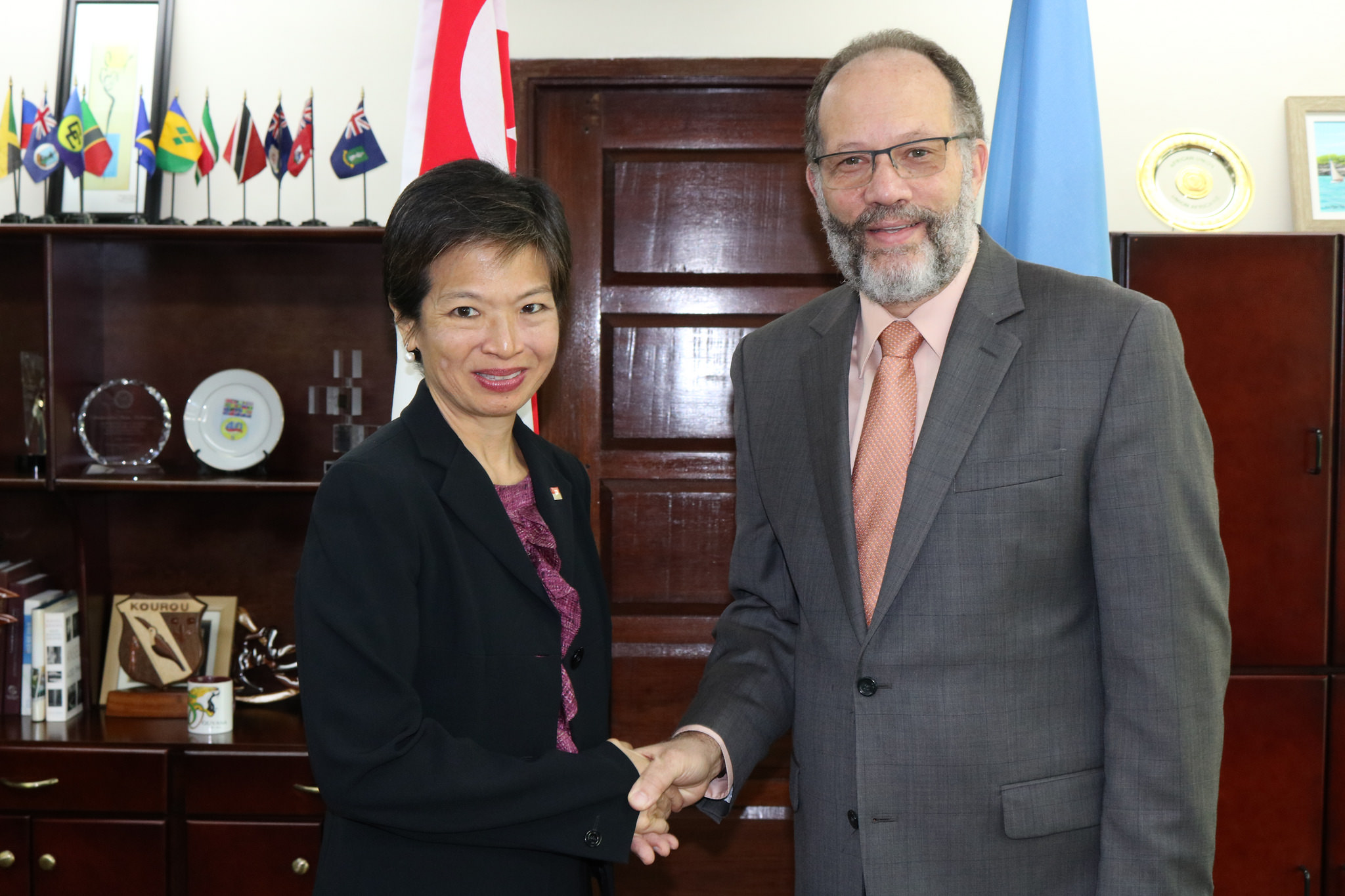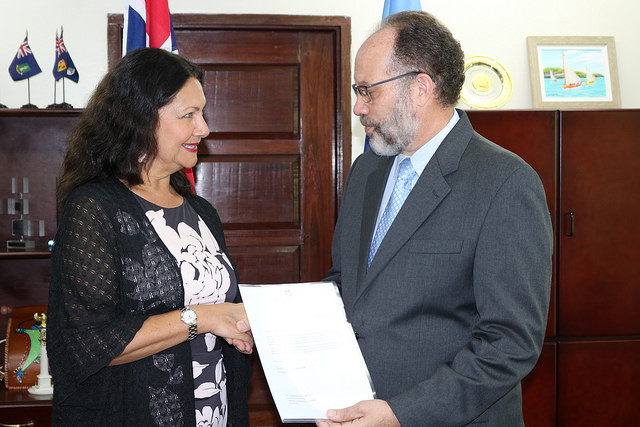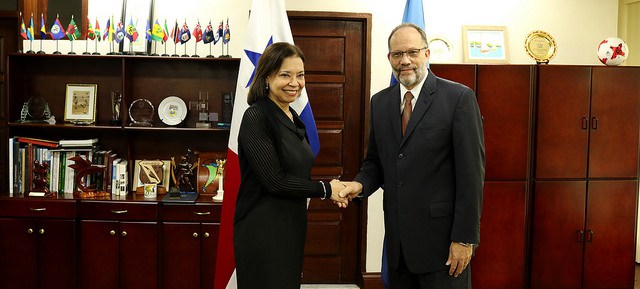“United for a Sustainable Caribbean”
1. The Seventh Summit of the Association of Caribbean States (ACS), meeting in Havana, Cuba, on 4 June, 2016;
2. Reaffirms the validity of the principles and objectives set out in the Convention Establishing the Association of Caribbean States, and its importance as an organization for consultation, coordination and cooperation so as to advance Latin American and Caribbean integration, which will result in benefits for all our peoples;
3. Recognizes the threats and challenges facing the Greater Caribbean and in particular, Small Island Developing States, for the achievement of sustainable development, and of the need to strengthen the coordination and cooperation capacities within the ACS to better face the challenges of the present world context, aggravated by economic and financial crises and the adverse impact of climate change;
4. Reiterates the responsibility of our States in building fair, equitable, people centered and inclusive societies, as well as the commitment with the promotion and protection of all human rights for all and with the aim of eradicating hunger and poverty it all its forms and dimensions, ensure food and nutritional security and universal access to quality education, among others, and meet the Goals and Targets included in the 2030 Agenda for Sustainable Development;
5. Reiterates, in addition, our unrestricted respect for the Purposes and Principles of the United Nations Charter and for the principles of International Law, which are essential for ensuring an environment of peace and cooperation, including the inalienable right of every State to determine its own political, economic, social, and cultural system;
6. Reaffirms our deep aversion to racism and all forms of discrimination, xenophobia and intolerance of any other guise, in our Caribbean and globally.
7. Recognizes that slavery and the slave trade were atrocious crimes against humanity, reaffirms the Durban Declaration, in particular, the importance of establishing compensatory and reparatory effective resources and measures, among others, at the national, regional and international levels in order to cope with the persistent effects of the slavery and the transatlantic slave trade, and welcomes CARICOM’s initiative for the creation of the Reparations Commission of the Caribbean Community, and praises the efforts of said commission to correct such injustices;
8. Reiterates our profound commitment to the upholding of the human rights of migrants, irrespective of their migration status. Reiterates, furthermore, the need for regular, orderly and safe migration and to ensure an effective struggle against the illegal traffic of migrants and trafficking in persons, as well as all discrimination against them, independently of their national or ethnic origin. Highlights also the social, cultural and economic contributions of migrants, irrespective of their migration status.
9. Ratifies the validity of the Proclamation of Latin America and the Caribbean as a Zone of Peace, signed by the Heads of State and Government of the region at the Second Summit of the Community of Latin American and the Caribbean States (CELAC), held in Havana in January 2014;
10. While agreeing to work for the consolidation of CELAC, underscores the importance of strengthening relations between the Community and the ACS as a contribution to jointly promoting dialogue, coordination and integration in the Region, without prejudice to existing coordination groups on issues of interest and relevance of the Community of Member States. Underlines, likewise the importance of also fostering coordination and articulation with other regional and subregional mechanisms and organizations, in particular CARICOM, OECS and SICA, aimed at achieving a more efficient use of resources and strengthening cooperation, complementarities and solidarity;
11. Reiterates our strong rejection of all unilateral lists and certifications that affect countries of our Association. Expresses our deep concern over the inclusion of ACS Member States on the list of non-cooperative jurisdictions of the European Union and call for a constructive dialogue between the affected countries and the European Union with the aim of reexamining the list based on objective criteria and on the commitments of countries in conformity with the standards adopted by the Transparency Global Forum and the exchange of information with taxing purposes (Global Fund);
12. Expresses, our deep concern and rejection to the progressive decline in correspondent banking relationships with developing countries, particularly Member States of the ACS, in light of recent de-risking actions by some of the major international banking partners, which poses a threat to the financial stability of the affected countries and limits their efforts towards sustained socio-economic growth and development;
13. Fully supports the consideration of the United Nations Economic Commission for Latin America and the Caribbean (ECLAC) Debt Initiative, which takes into consideration the highly indebted nature of many Caribbean nations and recommends an approach that recognizes the principles of the Financing for Development, the Sustainable Development Goals and proposes, among other initiatives to be considered, a Caribbean Resilience Fund for the countries benefitted by debt relief;
14. Reaffirms its commitment to a rule-based, open, transparent, predictable, inclusive, just, equitable and non-discriminatory multilateral trading system, in the context of the World Trade Organization, as well as to a trade liberalization, which allows reducing existing asymmetries and promoting the sustainable development of our countries, in particular of small economies. Rejects all actions which may undermine its integrity, and calls for the search of a prompt solution to the existing disputes on the basis of International Law;
15. Recognizes the importance of preserving Official Development Assistance and other types of concessional funding for sustainable development, in accordance with the national objectives and strategies Middle Income Countries in particular those highly-indebted. The present methodology of measuring development levels, solely based on per capita income, reduces access to concessional financing and does not consider the structural gaps of that group of countries. Urges donor countries and international financial institutions to introduce exceptions in policies of differentiation and graduation aimed at ensuring access to loans at concessionary rates by Middle Income Countries, specially highly indebted island developing countries and those vulnerable to external impacts;
16. Recognizes the importance of the mobilization of financial resources and other means of implementation to the effective implementation of the 2030 Agenda for Sustainable Development and in this regard, welcomes the Addis Ababa Action Agenda on Financing for Development;
17. Conscious of the vulnerability of the Greater Caribbean, particularly the Small Island Developing States and the Central American Isthmus, and of the negative impact of climate change on their economies, welcomes the adoption in March 2015, of the Sendai Framework for Disaster Risk Reduction 2015-2030; and reaffirms its guiding principles, in particular the fundamental role of the State in prevention and disaster risk reduction. It also commits to the success of the Fifth Session of Global Platform for Disaster Risk Reduction 2017 to be held in Cancun, Mexico in May 2017;
18. Ratifies the need to strengthen cooperation within the framework of the ACS, giving priority to a comprehensive disaster risk management approach and reducing the vulnerability of our countries to the risks of natural, biological, technological and man-made hazards, in order to decrease human and material losses. In this context it confirms the importance of creating synergies aimed at avoiding duplications and multiplying the impact of those measures taken;
19. Recognizes the initiative of the Humanitarian Assistance Logistical Center presented by the government of Panama, whose objective is to incorporate the emergency operations of various actors that would provide coordinated, rapid and efficient answers to the requests received from countries in Latin America and the Caribbean, in particular to the ACS members, constantly imperiled by disasters associated with the multiple threats prevalent in the region.
20. Recognizes the importance of the Caribbean Sea as a common asset of our peoples, according to the framework of what is set by the Convention Establishing the ACS, and the role it has played in the history and identity of the region and its potential as a unifying element in their development, and ratifies our shared responsibility in preserving its ecological integrity. Reiterates our firm and forceful rejection of the continued use of the Caribbean Sea for transit and transshipment of nuclear material and toxic waste and urges the countries that produce and transport them, to implement urgently relevant measures and establish reprocessing plants to end the need to transport such waste;
21. Ratifies its commitment to the protection of the Caribbean Sea and underscores the importance of the mandate of the Caribbean Sea Commission, recognized by Latin America and the Caribbean Heads of States and Governments in the IV CELAC Summit held January 27th 2016, to promote its preservation and sustainable use. Urges the Commission to finalize a work programme containing specific goals and objectives, for the development of the Caribbean Sea as a “Special Area in the Context of Sustainable Development”, as adopted in resolution A/RES/69/216 of the United Nations General Assembly. Requests the General Secretariat of the ACS to provide the necessary support for their achievement and to report regularly to the Ministerial Council of its progress and difficulties;
22. Recognizes the high vulnerability of our region to the serious effects of climate change and its negative consequences on our economies, societies, biodiversity, endemic and highly vulnerable species and fragile ecosystems, particularly coral reefs, especially in Small Island Developing States, mountain ranges, countries with low-lying coastal areas, and the Central America isthmus, well as for the entire planet. Comits itself to increase efforts to strengthen cooperation in the framework of ACS, and with other international bodies and agencies, especially with the Observer countries, through, among others, of the Programme of ACS to Counter Climate Change in the Greater Caribbean 2016-2018, implement actions to reduce present and future vulnerability to climate change of populations, human losses and damage to ecosystems and economic sectors, so as to advance in the adaptation process, including the implementation of comprehensive programmes and projects to strengthen our resilience, reduce our vulnerability and foster greater adaptation and mitigation;
23. Highlights the importance of the 21st Conference of the Parties to the United Nations Framework Convention on Climate Change that adopted the Paris Agreement and its accompanying decision, signed by 175 countries. This result, guided by the principles of the Convention and pursuant to Article 17 of the accompanying decision, strengthens the international framework in the struggle against climate change, and guides finance flows to low greenhouse gas emissions and climate-resilient development. Likewise, urges to strengthen the principle of common but differentiated responsibilities and respective capabilities, in light of diverse national circumstances in the context of sustainable development and efforts to eradicate poverty. Further urges developed countries to continue taking the leadership pursuant to the Convention and the Agreement, including the fulfillment of their commitments on new and additional financial resources as ODA, technology transfer, and capacity building in developing countries. Specially calls upon for international cooperation, particularly of Observer countries and other stakeholders committed to the Caribbean region. Also calls upon to strengthen the articulation between climate and environmental issues with the fight against poverty within the 2030 Agenda for Sustainable Development;
24. Welcomes with satisfaction the restoration of diplomatic relations between Cuba and the United States of America and the reopening of their respective embassies. Reiterates its deepest rejection to the application of unilateral coercive measures and reaffirms its call to the Government of the United States to put an end to the economic, commercial and financial blockade imposed on that sister nation, repeal the Helms-Burton Law and cease its extraterritorial application. Urges the President of the United States to use his broad executive powers to substantially modify the blockade;
25. Considers that the return to the Republic of Cuba of the territory occupied by the US Naval Base in Guantanamo should be a relevant element in the process of normalization of relations between the two countries, through a bilateral dialogue in conformity with International Law;
26. Firmly supports the completion of the dialogue process taking place between the Government of the Republic of Colombia and the Revolutionary Armed Forces of Colombia – People's Army (FARC-EP) and welcomes the progress achieved towards ending a conflict that has affected the social, economic and political development of that sister nation for more than 50 years, and expresses its support to the success of this process, as well as the one will begin with the National Liberation Army, so both could lead to a stable and lasting agreement in the best interests of the Colombian people;
27. Acknowledges current efforts to overcome the electoral crisis in Haiti, encourages and urges all actors to find, through dialogue, the commitment to free, fair, honest, transparent and inclusive elections as early as feasible. These would contribute both to the strengthening of democracy and creating a suitable environment for the country´s development.
28. Strongly condemns terrorism in all its forms and manifestations, wherever and by whosoever it is committed. Pledges to actively and effectively cooperate to prevent, investigate, punish and combat all manifestations of this scourge;
29. Reiterates its commitment to general and complete disarmament, including nuclear disarmament and, in this context, underlines its commitment to the Agency for the Prohibition of Nuclear Weapons in Latin America and the Caribbean (OPANAL). Urges those nuclear powers that have made reservations and interpretative declarations to the Treaty of Tlatelolco, to review and remove them;
30. Takes note of the debate carried out in the World Humanitarian Summit, held in Istanbul, Turkey, on 23 and 24 May and urges the international community to continue its efforts to strengthen the international humanitarian assistances system on the bases of Resolution 46/182 of the U.N. General Assembly and with full respect for the principles of International Law;
31. Reaffirms its will to unite our territories by sea and air routes to facilitate the exchange of goods and services that contribute to the development of trade and investment in the Caribbean. Invites all Member States and associate members to continue working on the development of multi-destination tourism projects and the creation of maritime and air lines;
32. Expresses its satisfaction over the upcoming inauguration of the Panama Canal expansion. This masterpiece of the twenty-first century will go on exerting a positive impact on the development of the maritime sector and the region´s economic circumstances, therefore, recognizes the efforts of the Panamanian people and government who, through this important platform of services, will continue contributing to the development of navigation, commerce and international maritime industry.
33. Ratifies its commitment to the promotion of sustainable tourism, as a central pillar for the fulfillment of the Sustainable Development Goals. In that sense, urges Member States and Associate Members to implement the Convention Establishing the Sustainable Tourism Zone of the Caribbean, which will result in the sustainability of our Caribbean Sea;
34. Welcomes the implementation of the Plan of Action of Pétionville and the commitments of Merida Declaration, with successful actions in priority and strategic areas; such as: the First Symposium on the Caribbean Sea “Challenges, Dialogue and Cooperation Towards Sustainability of the Caribbean Sea”; projects to strengthen our capacity for Disaster Risk Reduction, such as SHOCS project, the Project for Strengthening Spatial Data Infrastructures in Member States and Territories of ACS, the Caribbean Platform of Territorial Information for Disaster Prevention; proposals to improve connectivity and facilitate trade as Map of Maritime Routes, International Transit of Goods and Short Distance Maritime Transport; the establishment of the new Barbados-Bogota-Barbados route, thanks to the initiative of the Government of Colombia; the beginning of the first phase of the Sustainable Tourism Zone of the Caribbean with the support of Interreg program; Creation of the Carnival Network in Santiago de Cuba, and the beginning of Language Training program CIGAREL/INTERREG supported by the Government of Guadalupe;
35. Agrees to the approval of the Action Plans, which guide Committee work, every three years, and establish the required budget for its implementation at the Summits of Heads of State and / or Government, within the framework of the strategic pillars of the Association, on the basis of projects with a gender approach that contribute to the development of Member State countries, with concrete and measurable impacts;
36. Congratulates the Council of National Representatives of the Special Fund for organizing, together with the General Secretariat, the “Forum of National Cooperation Agencies” in December 2015, that developed recommendations to strengthen international cooperation in the field of ACS and urges to continue to improve management mechanisms for financing projects approved by the Ministerial Council in the priority areas identified by the Heads of State and Government;
37. Agrees, as a following stage in the successful process of revitalization, fulfilled in the last four years, to initiate a reflection process on the working mechanisms of the ACS, to continue deepening the effectiveness of its management, in accordance with the priorities set by Heads of State and / or Government of the Association. To that end, requests the Executive Board of the Ministerial Council to create a working group with the General Secretariat to present the appropriate proposals to the next Ministerial Council;
38. Welcomes the accession of the Community of San Martin, as an Associate Member of the ACS in its own name. In that sense, the ACS and the Government of the French Republic will sign an agreement to define the modalities of participation of San Martin as an Associate Member and an amending Protocol to the Agreement which defines the modalities of participation of the government of France as an Associate Member representing Guadeloupe, French Guiana and Martinique, signed in Mexico on May 24, 1996;
39. Recognizes that the majority of Member States and Associate Members have fulfilled their financial duties, which has allowed to increase the Regular Budget and thus to strengthen the organization, capacity and scope of their activities. Urges those who have not yet done so to fulfill their financial duties for the well-being of the Association;
40. Requests the General Secretariat to formalize the Special Fund Management Unit as a permanent office, in order to consolidate the managing of resources and international financing in priority areas of ACS. Likewise, urges Observer States and other stakeholders to also cooperate with the Special Fund;
41. Requests the Secretariat to work for the greater possible promotion of cooperation and development in the fields of culture and education in order to contribute to reinforcing unity in the Greater Caribbean and its overall and sustainable development.
42. Thanks and congratulates the Secretary General, His Excellency Ambassador Alfonso Munera Cavadía, for having successfully fulfilled his mandate at the head of the Association, in accordance with our goals and objectives; at the same time welcomes the election of Her Excellency, Ambassador June Soomer, as new Secretary General, whose qualities and commitment will boost the revitalization of the ACS, to which we reaffirm our strong support;
43. Adopts the Plan of Action 2016-2018 and instruct the Ministerial Council, pursuant to Article VIII of the Convention Establishing the ACS, to monitor and evaluate it at its next Ordinary Meeting, in order to ensure its effective implementation; and
44. Expresses our deep gratitude to the President of the Councils of State and Ministers of the Republic of Cuba, His Excellency Raul Castro Ruz, to the Cuban government and people for their hospitality and for the excellent manner in the organization of the VII Summit of ACS in Havana.
Havana, 4 June 2016
Download document






